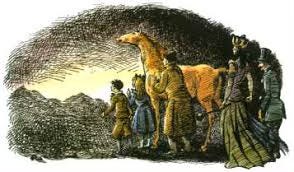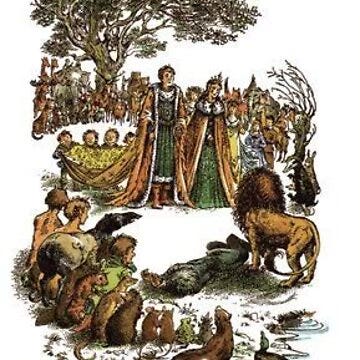Another Beginning
Back to the Future with The Magician's Nephew
One of the biggest challenges of life today is the lack of a positive vision of the future - some goal or target, some collective reason for living that we can all buy into. It might be a bit different in America at the moment, but certainly in Western Europe and the rest of the Anglosphere there’s very little sense of civilisational mission, no grand narrative or aim in which we can invest in as a people.
In the past we had the great cathedrals and in more recent times supersonic jets and rockets to the moon. But these days there don’t seem to be any such projects, and I think this goes a long way to explaining much of the neurosis and general loss of meaning that we see and feel around us. ‘Without a vision the people perish’, as William Blake perceptively noted. That vision can be physical or metaphysical or both (as with the cathedrals) but there has to be something, otherwise we just atrophy and turn in on ourselves as, without a purpose to give us direction and focus, society begins to fragment and dissolve, which is exactly what we’re living through now in the West.
Part of the problem, I feel, is that it’s hard to have a conception of the future if we don’t have a proper reverence and appreciation for our own deep past. Just as the horizons of the future have been radically slimmed down over the past few decades, so there is little, if any, celebration of the roots and genesis of European civilisation. The Norse, Greek, and Celtic creation myths - also the Biblical narrative - are treated as tales or fables with no tangible or concrete reality. We are, to all intents and purposes, discouraged from actively inhabiting these myths - living them from the inside, as it were - and understanding in the fabric of our being the profound levels of truth and meaning they contain.
Similarly, the great foundation texts of the West - The Iliad, The Odyssey, The Aeneid, etc. - are discussed most often from an academic, historical point of view. A film, from time to time, might be made of one of them and some entertainment value given to the masses, but young men are seldom, if ever, given Aeneas, for instance, as a role model to emulate. Why? Because, I believe, they would then be getting inside the head of a man with a divine mission to kick-start the greatest civilisation the world has ever seen. Some people who control the direction of contemporary culture are scared of this masculine energy. And so, with no rapturous invocation of the past, there can be no dynamic drive into the future. Our ships remained moored and our God-given lives tick by in an endless repetition of the same.
This is where The Magician’s Nephew helps, particularly Chapters 8, 9 and 10, which recount the creation of the Narnian cosmos. We see it unfolding through the eyes of the young protagonists, Digory and Polly, and this gives Lewis’s account a warm, personal touch. It feels like we’re present ourselves at the inception of the universe, which of course we are, so long as we read with attention and love and enter fully into the spirit of what’s being said.
There’s a vigour and freshness to the writing here, a zip and vitality that reconnects us to the origin of things - the aboriginal font and wellspring of all that lives and everything that is good and holy. It’s the only place to be; the only basecamp worth setting out from:
‘Hush!’ said the Cabby. They all listened.
In the darkness something was happening at last. A voice had begun to sing. It was very far away and Digory found it hard to decide from what direction it was coming. Sometimes it seemed to come from all directions at once. Sometimes he almost thought it was coming out of the earth beneath them. Its lower notes were deep enough to be the voice of the earth herself. There were no words. There was hardly even a tune. But it was, beyond comparison, the most beautiful noise he had ever heard. It was so beautiful he could hardly bear it …
Then two wonders happened at the same moment. One was that the voice was suddenly joined by other voices; more voices than you could possibly count. They were in harmony with it, but far higher up the scale: cold, tingling, silvery voices. The second wonder was that the blackness overhead, all at once, was blazing with stars. They didn’t come out gently one by one, as they do on a summer evening. One moment there had been nothing but darkness; next moment a thousand, thousand points of light leaped out - single stars, constellations, and planets, brighter and bigger than any in our world …
‘Glory be!’ said the Cabby. ‘I’d ha’ been a better man all my life if I’d known there were things like this.’
The voice belongs to Aslan, of course, and once he has finished singing Narnia into existence - stars, sun, trees, grass, animals, fauns, satyrs, and more - he doesn’t just leave like some ‘blind watchmaker’ and let things roll on of their own volition. Quite the contrary. First he gives this brand new realm a mission and vocation:
‘Narnia, Narnia, Narnia, awake. Love. Think. Speak. Be walking trees. Be talking beasts. Be divine waters.’
He then gives the talking animals some crystal clear guidance and structure:
‘Creatures, I give you yourselves,’ said the strong, happy voice of Aslan. ‘I give to you forever this land of Narnia. I give you the woods, the fruits, the rivers. I give you the stars and I give you myself. The Dumb Beasts whom I have not chosen are yours also. Treat them gently and cherish them but do not go back to their ways lest you cease to be Talking Beasts. For out of them you were taken and into them you can return.’
He then invites the Narnians - straight away, on the very first day of their world - to take responsibility with him for the security and maintenance of their land:
‘And now,’ said Aslan, ‘Narnia is established. We must next take thought for keeping it safe. I will call some of you to my council. Come hither to me, you the chief Dwarf, and you the River-god, and you Oak and the He-Owl, and both the Ravens and the Bull-Elephant. We must talk together. For though the world is not five hours old en evil has already entered it.’
Finally, towards the end of the book, we have the splendid coronation of Frank and Helen, the first King and Queen of Narnia:
When the crowns had been cooled in the river Aslan made Frank and Helen kneel before him and he placed the crowns on their heads. Then he said, ‘Rise up King and Queen of Narnia, father and mother of many kings that shall be in Narnia and the Isles and Archenland. Be just and merciful and brave. The blessing is upon you.’
Then everyone cheered or brayed or neighed or trumpeted or clapped its wings and the royal pair stood looking solemn and a little shy, but all the nobler for their shyness.
The point of these quotes is that they illustrate the sharp, clear Mythos on which the Narnian sense of self is based. There’s nothing vague or fuzzy here. It’s distinct and well-defined, serving as a platform for a largely joyous, peaceful national story, interrupted only by the long winter of the White Witch (see The Lion, The Witch, and The Wardrobe) and the three-hundred year tyranny of the Telmarines (see Prince Caspian). Both Jadis and the Telmarine kings seek to quash ancestral memories of Narnia’s rich spiritual heritage. Like many in power today, they know that a people without a past can have no say or influence on their future.
It’s high time then that we connected back to the new-minted wonder of the first day of creation, what Gerard Manley Hopkins in God’s Grandeur calls ‘the dearest freshness deep down things.’ We might find then that outside forces lose their psychological hold and that a more meaningful, purposive future comes clearer into focus. It has to happen really because the alternative is either long-term subjugation and/or continued entropic decline. And that would be wrong - contra the natural order of things - for neither of these motifs can be found in the song of creation that was sung for us at the dawn of time.
Like the Prodigal Son, we need to divest ourselves of illusion and walk in humility back to the Real. We’ll be able to hear the Voice again then and embark on another beginning, as if for the first time. And the beauty and the brightness and the newness and the splendour will amaze and astound us.
‘Glory be!’ we’ll say to ourselves. ‘We’d have been better men and women all our lives if we’d known there were things like this.’





I have discovered your Substack from the comment you left on my blog "The Blue Flower". We are becoming a community of thinkers without any formal links or association. The important is to keep studying and writing along with our life of prayer.
The post begins with:
> One of the biggest challenges of life today is the lack of a positive vision of the future - some goal or target, some collective reason for living that we can all buy into.
...
> In the past we had the great cathedrals and in more recent times supersonic jets and rockets to the moon. But these days there don’t seem to be any such projects, and I think this goes a long way to explaining much of the neurosis and general loss of meaning that we see and feel around us.
Given that point of view, how do you interpret the story of the Tower of Babel in Genesis 11?
(“Come,” they said, “let us build for ourselves a city with a tower that reaches to the heavens, that we may make a name for ourselves and not be scattered over the face of all the earth.” )